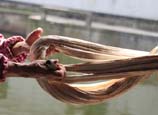
New Zealand agriculture exports to China had been "booming along" since the signing of a bilateral free trade agreement in 2008.
Last week, Statistics New Zealand announced China had overtaken Australia in the March quarter to become New Zealand's biggest trade partner, with exports to China up 47 percent, or 278 million NZ dollars (237.95 million U.S. dollars), on the previous quarter, led by sales of meat, milk powder and pine logs.
The cooperation agreement was "recognition that China is a vitally important market that we've got to keep growing."
"It's our largest lamb market by volume; it's our biggest wool market; it's our biggest forestry market; and it's certainly a very significant and growing exponentially dairy market for us," said Wills.
International concerns over the discovery of traces of Dicyandiamide (DCD), a pasture treatment chemical, in New Zealand dairy products in January had highlighted the fragility of the market and the need for New Zealand producers to better understand it, he said.
Chinese companies are stepping up investment in New Zealand's agriculture sector with Guangdong-based Yashili International Holdings and Inner Mongolia's Yili Industrial Group last month announcing they had received approval from New Zealand's Overseas Investment Office (OIO), which considers all foreign investments of at least 100 million NZ dollars, for major projects.
Yashili is to invest 230 million NZ dollars in building a milk processing plant just south of Auckland, while Yili is buying New Zealand's Oceania Dairy, which has plans to build an infant formula processing plant in the South Island's Canterbury region.
Other Chinese investors in New Zealand's dairy sector include Shanghai-based Bright Dairy, which purchased a 51-percent stake in the Synlait Milk processing firm in 2010, and Shanghai Pengxin, which fought a long and bitter court battle last year to purchase 16 North Island dairy farms. (One U.S. dollar equals 1.17 NZ dollars)

















 Different walks of life in China : Labor Day
Different walks of life in China : Labor Day


![]()
